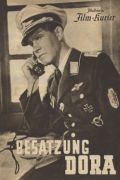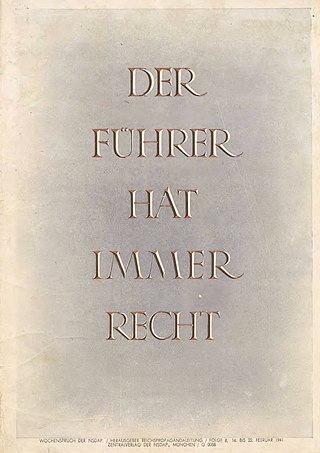
The Führerprinzip was the basis of executive authority in the government of Nazi Germany. It placed the Führer's word above all written law, and meant that government policies, decisions, and officials all served to realize his will. In practice, the Führerprinzip gave Adolf Hitler supreme power over the ideology and policies of his political party; this form of personal dictatorship was a basic characteristic of Nazism. The state itself received "political authority" from Hitler, and the Führerprinzip stipulated that only what the Führer "commands, allows, or does not allow is our conscience," with party leaders pledging "eternal allegiance to Adolf Hitler."

Kolberg is a 1945 Nazi propaganda historical film written and directed by Veit Harlan. One of the last films of the Third Reich, it was intended to bolster the will of the German population to resist the Allies.
Volksgemeinschaft is a German expression meaning "people's community", "folk community", "national community", or "racial community", depending on the translation of its component term Volk. People who belonged to the Volksgemeinschaft were known as Volksgenossen. This expression originally became popular during World War I as Germans rallied in support of the war, and many experienced "relief that at one fell swoop all social and political divisions could be solved in the great national equation". The idea of a Volksgemeinschaft was rooted in the notion of uniting people across class divides to achieve a national purpose, and the hope that national unity would "obliterate all conflicts - between employers and employees, town and countryside, producers and consumers, industry and craft".
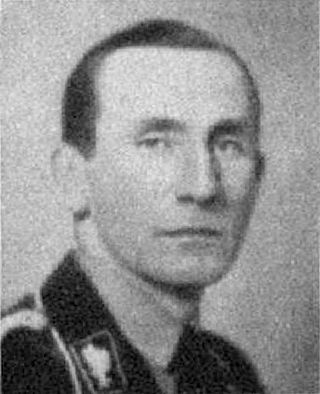
Udo Gustav Wilhelm Egon von Woyrsch was a Nazi Party politician and SS-Obergruppenführer in Nazi Germany who participated in the massacre of Jews in Poland, and was later convicted of being an accessory to manslaughter in connection with the Night of the Long Knives murders.

Morgenrot is a 1933 German submarine film set during World War I.
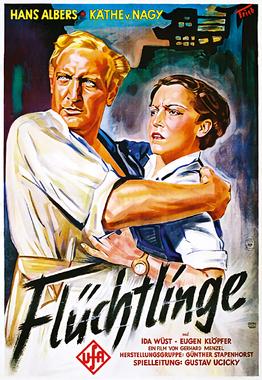
Refugees is the 1933 German drama film, directed by Gustav Ucicky and starring Hans Albers, Käthe von Nagy, and Eugen Klöpfer. It depicts Volga German refugees persecuted by the Bolsheviks on the Sino-Russian border in Manchuria in 1928.

Ohm Krüger is a 1941 German biographical film directed by Hans Steinhoff and starring Emil Jannings, Lucie Höflich, and Werner Hinz. It was one of a series of major propaganda films produced in Nazi Germany attacking the United Kingdom. The film depicts the life of the South African politician Paul Kruger and his eventual defeat by the British during the Boer War.

Frisians in Peril is a 1935 German drama film directed by Peter Hagen and starring Friedrich Kayßler, Jessie Vihrog and Valéry Inkijinoff. Made for Nazi propaganda purposes, it concerns a village of ethnic Frisians in Russia.
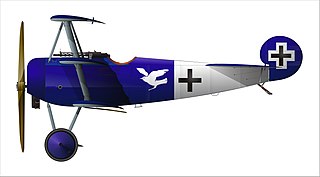
Royal Prussian Jagdstaffel 15, commonly abbreviated to Jasta 15, was a "hunting group" of the Luftstreitkräfte, the air arm of the Imperial German Army during World War I. The unit would score over 150 aerial victories during the war, at the expense of seven killed in action, two killed in flying accidents, three wounded in action, one injured in a flying accident, and two taken prisoner of war.

My Life for Ireland is a 1941 Nazi German anti-British propaganda drama film produced in World War II. Directed by Max W. Kimmich, it tells a story of an Irish nationalist family and their involvement in the Irish struggle of independence over two generations. The film's sets were designed by the art directors Wilhelm Depenau and Otto Erdmann.

The Ruler is a 1937 German drama film directed by Veit Harlan. It was adapted from the play of the same name by Gerhart Hauptmann. Erwin Leiser calls it a propagandistic demonstration of the Führerprinzip of Nazi Germany. The film's sets were designed by the art director Robert Herlth. Location shooting took place around Oberhausen and Pompeii near Naples. It premiered at the Ufa-Palast am Zoo in Berlin.
I Accuse is a 1941 Nazi German pro-euthanasia propaganda film directed by Wolfgang Liebeneiner and produced by Heinrich Jonen and Ewald von Demandowsky. It was developed to promote the involuntary euthanasia of disabled people conducted through the Aktion T4 mass murder program and to garner public support for the Nazi concept of life unworthy of life.

Carl Peters is a 1941 German historical drama film directed by Herbert Selpin and starring Hans Albers, Karl Dannemann, and Fritz Odemar. It was produced as an anti-British propaganda film during the Second World War.

Nazi propaganda towards the United Kingdom changed its position over time in keeping with Anglo-German relations. Prior to 1938, as the Nazi regime attempted to court the British into an alliance, Nazi propaganda praised the "Aryan" character of the British people and the British Empire. However, as Anglo-German relations deteriorated, and the Second World War broke out, Nazi propaganda vilified the British as oppressive German-hating plutocrats. During the war, it accused "perfidious Albion" of war crimes and sought to drive a wedge between Britain and France.

Hitlerjunge Quex,, is a 1933 German film directed by Hans Steinhoff, based on the similarly named 1932 novel Der Hitlerjunge Quex by Karl Aloys Schenzinger. It was released in the United States as Our Flag Leads Us Forward.
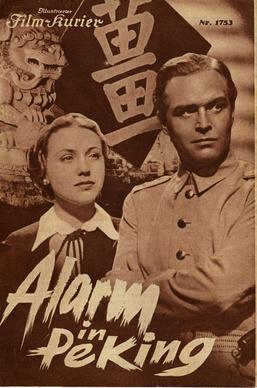
Alarm in Peking is a 1937 German adventure film directed by Herbert Selpin and starring Gustav Fröhlich, Leny Marenbach, and Peter Voß. It is set against the backdrop of the 1900 Boxer Rebellion in China. German filmmakers had frequently used China as a setting since the 1910s, but from 1931 onwards they made a series of films with political overtones. It was shot at the Johannisthal Studios in Berlin. The film's sets were designed by the art director Alfred Bütow and Willi Herrmann.
Jürgen Ohlsen was a German actor best remembered for portraying "Heini "Quex" Völker" in the 1933 Nazi propaganda film Hitlerjunge Quex.
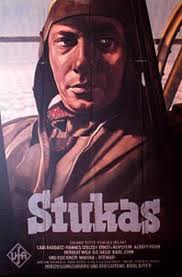
Stukas is a 1941 Nazi propaganda film, directed by Karl Ritter and starring Carl Raddatz, which follows three squadrons of Luftwaffe dive-bomber (Stuka) flyers.
Ernst von Klipstein was a German film and television actor. von Klipstein became a prominent actor during the Nazi era, appearing in a large number of action films.
Hannes Stelzer was an Austrian film actor. Stelzer was a leading actor in German cinema during the Nazi era.
